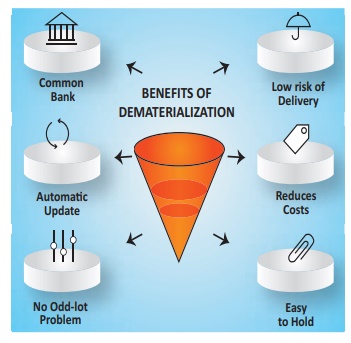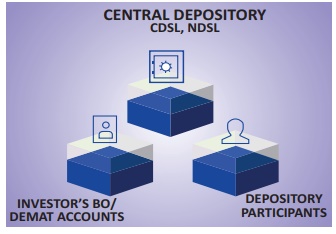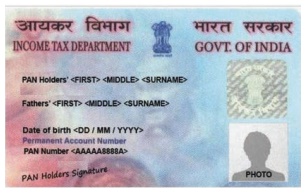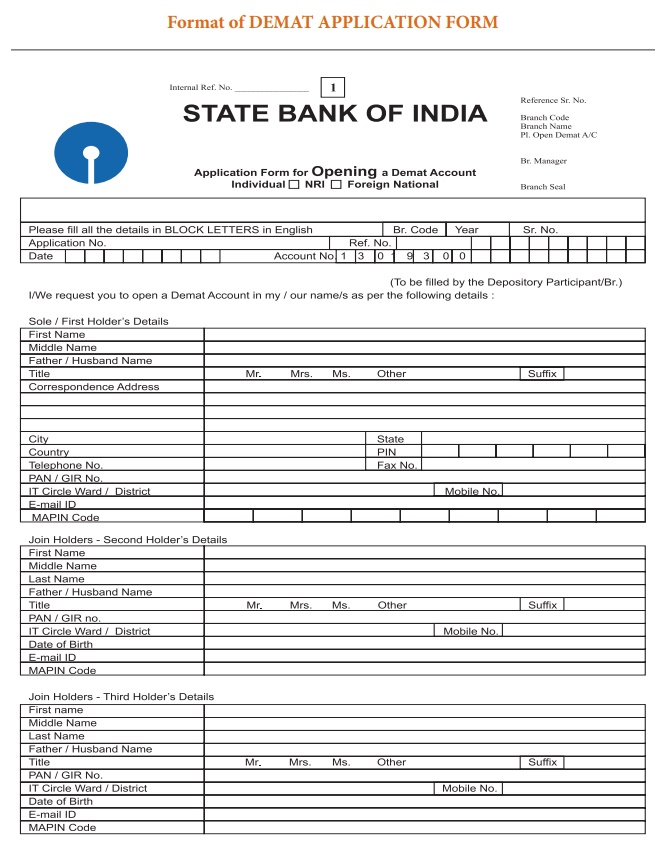Chapter: 12th Commerce : Chapter 8 : Financial Markets : Securities Exchange Board of India (SEBI)
Benefits of Dematerialization (DEMAT)
Benefits of Dematerialization
i. The risks pertaining to physical certificates
like loss, theft, forgery and damage are eliminated completely with a DEMAT
account.
ii. The lack of paperwork enables quicker
transactions and higher efficiency in trading.
iii. Trading has become more convenient as one can
trade through computers at any location, without the need of visiting a broker.
iv. The shares that are created through mergers and
consolidation of companies are credited automatically in the DEMAT account.
v. As all the transactions occur through the
depository participant, a trader does not have to communicate individually with
each and every company.
vi. There is no need for stamp duty for transfer of
securities; this brings down the cost of transaction significantly.
vii. Certain banks also permit holding of both
equity and debt securities in a single account.
Banks also provide dedicated and trained customer
care officers to assist through all the procedures.
ix. A DEMAT account holder can buy or sell any amount
of shares. However, there is limit on the number of transactions done using
physical securities.
x. One can also choose to take a loan against
securities which are held in a DEMAT account by offering it as a collateral to
the lender.

What is Demat Account?
A demat account holds all the shares that are
purchased in electronic or dematerialized form. Basically, a demat account is
to shares what a bank account is to money. Like the bank account, a demat
account holds the certificates of financial instruments like shares, bonds,
government securities, mutual funds and exchange traded funds (ETFs).
Understand
How Does Demat Account Works:

How to Open a Demat Account?
i. Fill up an account opening form and submit along
with copies of the required documents and a passport-sized photograph. You also
need to have a PAN card. Also carry the original documents for verification.

ii. You will be provided with a copy of the rules
and regulations, the terms of the agreement and the charges that you will
incur.
iii. During the process, an In-Person Verification
would be carried out. A member of the DP’s staff would contact you to check the
details provided in the account opening form.
iv. Once the application is processed, the DP will
provide you with an account number or client ID. You can use the details to
access your demat account online.
v. As a demat account holder, you would need to pay
some fees like the annual maintenance fee levied for maintenance of account and
the transaction fee levied for debiting securities to and from the account on a
monthly basis. These fees differ from every service provider (called a
Depository Participant or DP). While some DPs charge a flat fee per
transaction, others peg the fee to the transaction value, and are subject to a
minimum amount. The fee also differs based on the kind of transaction (buying
or selling). In addition to the other fees, the DP also charges a fee for
converting the shares from the physical to the electronic form or vice-versa.
vi. Minimum shares: A demat account can be opened
with no balance of shares. It also does not require that a minimum balance be
maintained.
What are the documents required for a Demat Account?
You need to submit proof of identity and address
along with a passport size photograph and the account opening form. Only
photocopies of the documents are required for submission, but originals are
also required for verification.
Proof of identity: PAN card, voter's ID, passport, driver's
license, bank attestation, IT returns, electricity bill, telephone bill, ID
cards with applicant's photo issued by the central or state government and its
departments, statutory or regulatory authorities, public sector undertakings
(PSUs), scheduled commercial banks, public financial institutions, colleges
affiliated to universities, or professional bodies such as ICAI, ICWAI, ICSI,
bar council etc.
Proof of address: Ration card,
passport, voter ID card, driving license, bank passbook
or bank statement, verified copies of electricity bills, residence telephone
bills, leave and license agreement or agreement for sale, self-declaration by
High Court or Supreme Court judges, identity card or a document with address issued
by the central or state government and its departments, statutory or regulatory
authorities, public sector undertakings (PSUs), scheduled commercial banks,
public financial institutions, colleges affiliated to universities and
professional bodies such as ICAI, ICWAI, Bar Council etc.
Key Terms
Quasi-Legislative
Quasi-Judicial
Quasi-executive
Dematerialization
Demat-account
Depository

PAN, or permanent account number, is a unique 10-digit alphanumeric
identity allotted to each taxpayer by the Income Tax Department under the
supervision of the Central Board of Direct Taxes. It also serves as an identity
proof.

Case Study
a. Koushikaa’s father has gifted her the
shares of a large cement company with which he had been working. The securities
were in physical form. She already has a bank account and does not possess any
other forms of securities.
She wishes to sell the shares and
approached a registered broker for the purpose. Mention one mandatory detail
which she will have to provide with the broker.
b. Dr.Kulandaivel was the Chairman of
Thangam Bank. The bank was earning good profits. Shareholders were happy as the
bank was paying regular dividends. The market price of their share was also
steadily rising. The bank was about to announce taking over the ‘Trinity Bank’.
Mr.Kulandaivel knew that the share price of Thangam Bank would rise on this
announcement. Being a part of the bank, he was not allowed to buy shares of the
bank. He called one of the his rich friends Mr.Chandrasekaran and asked him to
invest ₹5 crores in shares of his bank promising him the capital gains.
As expected, the share prices went up by
40% and the market price of Chandrasekaran’s shares was now ₹7 crores. He
earned a profit of ₹2 crores. He gave ₹1 crore to Mr.Kulandaivel and kept ₹1
crore with himself. On regular inspection and by conducting enquires of the
brokers involved, the Securities and Exchange Board of India (SEBI) was able to
detect this irregularity. The SEBI imposed a heavy penality on Mr.Kulandaivel.
By quoting the lines from the above
paragraph, identify and state any two functions
that were performed by SEBI in the above case.
For Own Thinking
1. Collect the information on various
measures taken by SEBI to protect the interests of investors since its
inception.
2. Send a group of students to a trading
terminal in your city to gain first hand information on securities trading and
prepare a report.
3. Collect information about SEBI action
for Investor Protection taken duringlast two years.
For Own Thinking
1. Prepare a report on the role of SEBI
in regulating the Indian stock market.
You can get this information on its
website namely www.sebi.gov.in. Do you think something else should be done to
increase the number of investors in the stock market?
2. Investors’ Grievances Redressal
i. SEBI and Stock Exchanges have set up
investor grievance redressal cells for fast redressal of investor complaints
relating to securities markets
ii. SEBI has directed all the stock
exchanges, registered brokers, sub-brokers, depositories and listed companies
to make a provision for a special email ID of the grievance redressal division/
compliance officer for the purpose of registering complaints by the investors
iii. SEBI has set up a mechanism for
redressal of investor grievances arising from the issue process
iv. SEBI provides “walk-in” service at
its head office at Mumbai and its regional offices at New Delhi, Chennai,
Kolkatta and Ahmedabad on all working days. Investors can meet the officials
and get guidance relating to the grievances that they may have against issuers.
Investors can also meet the higher officials of SEBI on specified working days
v. Investors can lodge their complaints
with SEBI at: investorcomplaints@sebi.gov.in
vi. Investors can approach SEBI for any
assistance at: asksebi@sebi.gov.in
Related Topics